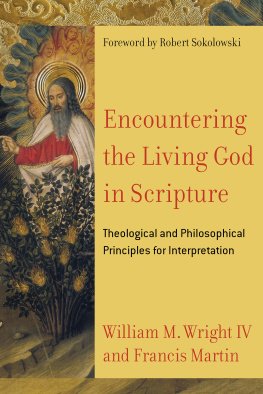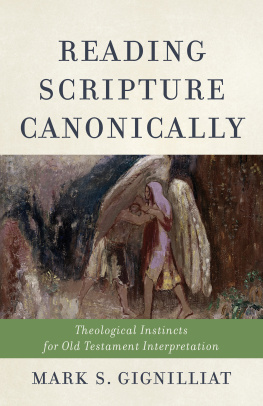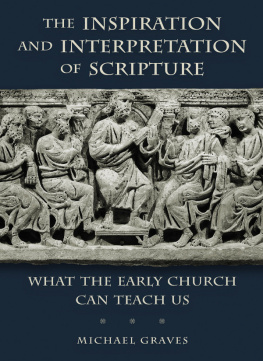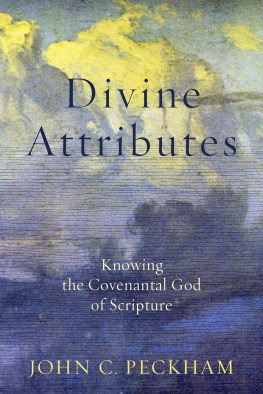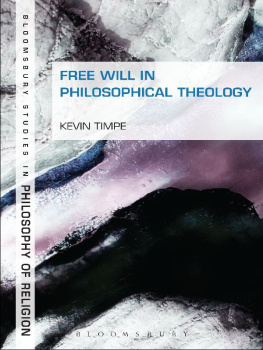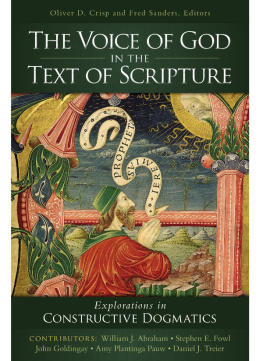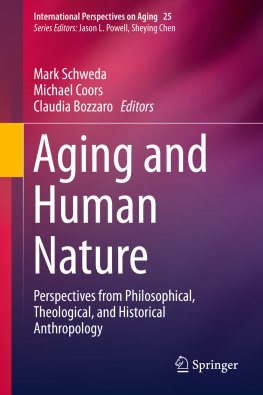William M. IV Wright - Encountering the Living God in Scripture: Theological and Philosophical Principles for Interpretation
Here you can read online William M. IV Wright - Encountering the Living God in Scripture: Theological and Philosophical Principles for Interpretation full text of the book (entire story) in english for free. Download pdf and epub, get meaning, cover and reviews about this ebook. year: 2019, publisher: Baker Publishing Group, genre: Religion. Description of the work, (preface) as well as reviews are available. Best literature library LitArk.com created for fans of good reading and offers a wide selection of genres:
Romance novel
Science fiction
Adventure
Detective
Science
History
Home and family
Prose
Art
Politics
Computer
Non-fiction
Religion
Business
Children
Humor
Choose a favorite category and find really read worthwhile books. Enjoy immersion in the world of imagination, feel the emotions of the characters or learn something new for yourself, make an fascinating discovery.
- Book:Encountering the Living God in Scripture: Theological and Philosophical Principles for Interpretation
- Author:
- Publisher:Baker Publishing Group
- Genre:
- Year:2019
- Rating:3 / 5
- Favourites:Add to favourites
- Your mark:
- 60
- 1
- 2
- 3
- 4
- 5
Encountering the Living God in Scripture: Theological and Philosophical Principles for Interpretation: summary, description and annotation
We offer to read an annotation, description, summary or preface (depends on what the author of the book "Encountering the Living God in Scripture: Theological and Philosophical Principles for Interpretation" wrote himself). If you haven't found the necessary information about the book — write in the comments, we will try to find it.
William M. IV Wright: author's other books
Who wrote Encountering the Living God in Scripture: Theological and Philosophical Principles for Interpretation? Find out the surname, the name of the author of the book and a list of all author's works by series.
Encountering the Living God in Scripture: Theological and Philosophical Principles for Interpretation — read online for free the complete book (whole text) full work
Below is the text of the book, divided by pages. System saving the place of the last page read, allows you to conveniently read the book "Encountering the Living God in Scripture: Theological and Philosophical Principles for Interpretation" online for free, without having to search again every time where you left off. Put a bookmark, and you can go to the page where you finished reading at any time.
Font size:
Interval:
Bookmark:
2019 by William M. Wright IV
Published by Baker Academic
a division of Baker Publishing Group
PO Box 6287, Grand Rapids, MI 49516-6287
www.bakeracademic.com
Ebook edition created 2019
All rights reserved. No part of this publication may be reproduced, stored in a retrieval system, or transmitted in any form or by any meansfor example, electronic, photocopy, recordingwithout the prior written permission of the publisher. The only exception is brief quotations in printed reviews.
Library of Congress Cataloging-in-Publication Data is on file at the Library of Congress, Washington, DC.
ISBN 978-1-4934-1681-3
Scripture quotations are from the New Revised Standard Version of the Bible, copyright 1989, by the Division of Christian Education of the National Council of the Churches of Christ in the United States of America. Used by permission. All rights reserved.
In Memoriam
Fr. Francis Martin
(19302017)
Those who are wise shall shine like the brightness of the sky, and those who lead many to righteousness, like the stars forever and ever.
Daniel 12:3
Those who love me will keep my word, and my Father will love them, and we will come to them and make our home with them.
John 14:23
Cover
Half Title Page
Title Page
Copyright Page
Dedication
Foreword by Robert Sokolowski
Preface
Abbreviations
Introduction
Part 1: Fides
1. The Word of God: Power and Presence
2. The Word of God in the Inspired Speech of the Prophets
3. The Word of God in the Inspired Speech of the Apostles
4. The Word of God in Inspired Written Discourse
Conclusion to Part 1
Part 2: Quaerens Intellectum
5. God and the World: The Distinction
6. The Metaphysics of the Created World
7. Creation, the Bible, and the Question of Transcendence
8. Creation and the Communion of Mind, Words, and World
9. The Mediation of Divine Reality through the Biblical Text
10. Encountering the Living God in Scripture: The Holy Spirit and Spirituality
Conclusion to Part 2
Index
Back Cover
Reading and Responding to the Word of God
R OBERT S OKOLOWSKI
T his book is written to show how we can read the Scriptures as being addressed to us, not only by their particular authors, such as the psalmist or Saint Paul, but also by their primary author, God himself, whose words the Scriptures ultimately are. The book also shows how we can read the Scriptures as our response to the God who speaks to us through them; we may not respond to the particular authors, to the evangelists or to Saint James, but we can and should use the words that have been authored by God when we pray to him, whether in the community of the church or by ourselves. The way God uses the words of Scripture is different from the way its human writers use them, and the best and only correct way for us to read them is in the light of that difference. If we did not read the Scriptures as Gods Word to us, we would not be reading them as the Scriptures themselves say that we should. This is the point made by William M. Wright and Fr. Francis Martin in their book, and in their work as authors they help us fulfill the obligation that they describe.
Toward the end of the book the authors give us four examples of people who read the Scriptures in this way: Saint Antony of Egypt, Saint Augustine of Hippo, Saint Francis of Assisi, and Saint Thrse of Lisieux. These readers lived at different times in the history of the churchthe patristic, the medieval, the modernand each of them is identified not only by their proper name but also by the place they are from, which locates them in a particular human and Christian community that provided them with the Scriptures and with a context for hearing and reading them. In each case, this personal encounter with the words and their author led to achievements that influenced the lives of countless others. The four instances are presented not just as anecdotes but as rhetorical paradigms. As examples of what has been done, they show what we might do on a smaller but still appropriate scale in our time and place. They are tangible instances of what this book is about, and they show us that such things, such readings, do happen; and they imply that we should go and do likewise.
The rest of the book is more theoretical. It is divided, elegantly, into two parts: Fides , which is based more immediately on passages from Scripture, and Quaerens Intellectum , which involves philosophical and theological reflections.
Part 1, Fides , is subdivided into four chapters. First, Gods own words are shown to be creative and effective. God achieves the existence of things effortlessly by simply speaking them; he speaks and it is done; what is said comes to be. There is no need for struggle or conquest. Also, God guides people and events through history and brings about coherence in unexpected ways, despite human folly, malice, and disobedience. Second, we are shown that Gods Word can be spoken, not just by God, but also by inspired human speakers, the prophets (and lawgivers, narrators, and psalmists) of the Old Testament. They do not speak only in their own voice; when the psalmist, for example, repents for what he has done or praises Gods benevolence, he speaks not just as a human poet whose skill we might admire but as someone who speaks the way God wants him to. We can therefore use what he says when we strive to place ourselves in the presence of God. Third, this coordination between Gods Word and human words is recapitulated in the New Testament, where the apostles take the place of the prophets, in an adjustment that is appropriate for what occurred when the eternal Word of God became incarnate and brought about a new creation in his redemptive death and resurrection. John the Baptist was a prophet but the apostles were not, because the presence and action of God in the world had changed. The apostles were more than the prophets and were only analogous to them. It was their remembrances, not their anticipations, that were to be the euangelion , and their inspiration was different as well. The Holy Spirit, having been promised by Christ, has come and now works in a new, sacramental way. Finally, chapter 4 deals with the transformation of the remembrances of the apostles into a written form, along with the old covenants prior commitment to writing. This shift from speaking to writing was also carried out under the guidance of the Holy Spirit. God is not only the author but also the primary editor and publisher of the sacred Scriptures, as well as the one who guides those who read and hear the Scriptures as they were meant to be received. The Word of God has gone through the spoken stages of prophecy and apostolic proclamation and has settled into writing, which is the way it will remain, as read and spoken in the church, for the duration. The development of writing was part of the praeparatio evangelica .
Part 2, Quaerens Intellectum , uses resources from philosophy and theology to clarify how the Scriptures can truly be what we believe them to be. The authors make use of two forms of philosophy, phenomenology and metaphysics, and in both cases the philosophical style is adjusted to deal with biblical things. It morphs into theology. Thus, we deal not just with the phenomenology of things in the world, but with the understanding of God as radically distinguished from the world as a whole; God is understood as capable of being, in undiminished goodness and greatness, even if there had been no world, and he is disclosed to us as being in this way. This is the background against which the Scriptures must be understood; it is the background described in the Scriptures, and we have inklings of it even apart from them. Ontologically, this understanding of things can be expressed by speaking of God as sheer unqualified existence, with all other things understood to participate in Gods activity of being. The core perfection in all entities is their existence, which actualizes each of them in their limited and modified way. What entities are and what they can do depends on and reveals their natures, which in turn reveal the perfection of their being, and this perfection in turn is now seen to have been chosen and granted by the one who is existence itself, ipsum esse . Human reason can reach such an understanding of things; it is, therefore, not extinguished when it reaches this kind of transcendence. Rather, it is enlarged and strengthened as it glimpses that which is most worth knowing and most to be loved.
Font size:
Interval:
Bookmark:
Similar books «Encountering the Living God in Scripture: Theological and Philosophical Principles for Interpretation»
Look at similar books to Encountering the Living God in Scripture: Theological and Philosophical Principles for Interpretation. We have selected literature similar in name and meaning in the hope of providing readers with more options to find new, interesting, not yet read works.
Discussion, reviews of the book Encountering the Living God in Scripture: Theological and Philosophical Principles for Interpretation and just readers' own opinions. Leave your comments, write what you think about the work, its meaning or the main characters. Specify what exactly you liked and what you didn't like, and why you think so.

